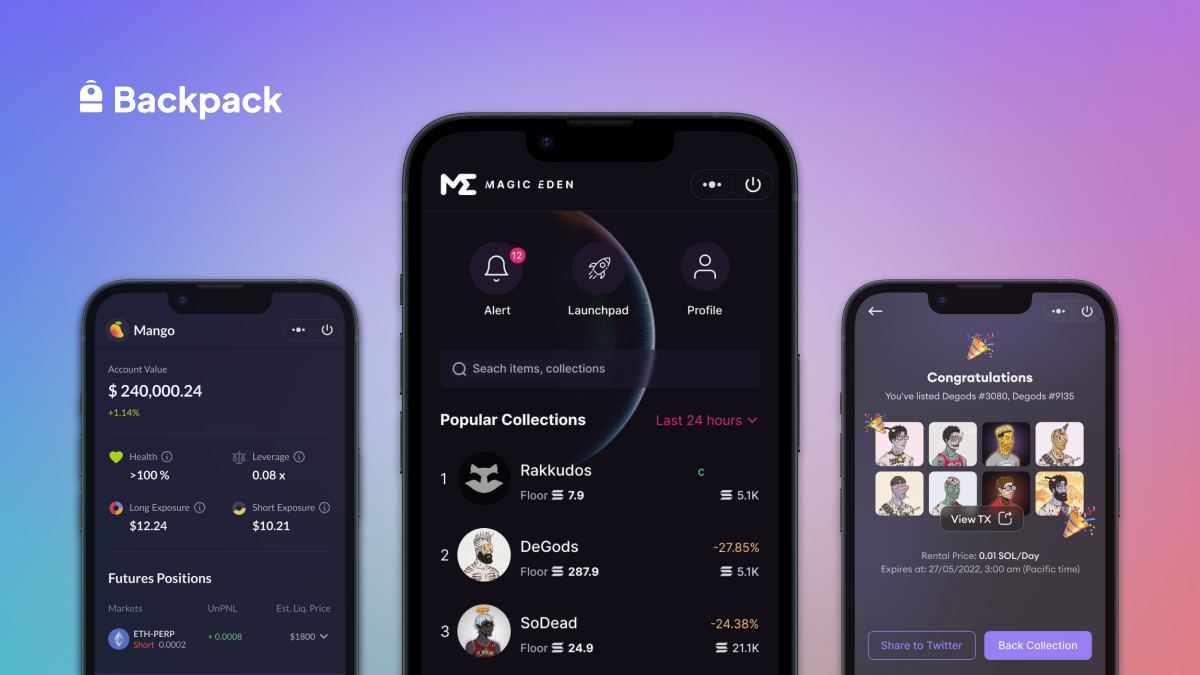Developers are a huge catalyst for growth in the competitive world of layer-one blockchains. Where the devs go, they build out applications and robust ecosystems, and user activity and interest tends to follow.
Coral has been instrumental in building out dev tools for the Solana blockchain ecosystem. The startup created Anchor, which it says is the most popular smart contract developer framework for Solana. Anchor is similar to Ethereum’s Hardhat or Ruby on Rails in the web2 world, founder Armani Ferrante told TechCrunch in an interview.
The company announced today that it has raised a $20 million strategic round led by FTX Ventures and Jump Crypto with participation from Multicoin Capital, Anagram, K5 Global and others. It plans to use the funding to launch a product called Backpack, an interactive crypto wallet that it says delivers crypto-native experiences through what the company calls executable NFTs (xNFTs).
Ferrante explained the product through an analogy — Apple’s iPhone. The Backpack wallet, Ferrante said, is like the iPhone’s iOS operating system, where a user can manage their private keys and access xNFTs, which are like the apps on the iPhone.
“On top of Backpack, we have this concept of xNFTs. So we have not just these decentralized protocols, but we also have decentralized applications or UIs, and we can have this curated experience for xNFTs,” Ferrante said.
Coral also provides a developer tool called ReactxNFT, which Ferrante said could compare to Apple’s Swift and UIKit packages.
“We have the ability to build on this platform and take advantage of these API’s to build compelling user experiences on top of Backpack,” Ferrante said.
Eventually, Ferrante hopes to develop Backpack into a “network in its own right” to help establish a concept of multi-chain identity for users in web3 through xNFTs.
“I could do things like play games with [xNFTs], I could do things like see if they’re online and connected and what they’re doing on the blockchain. I think building this as a primitive and exposing it to applications is going to be a really powerful feature. That’s going to be the unique thing that brings all this together to create a truly social experience that wrangles a lot of the problems that we see in web3 today,” Ferrante said.

xNFTs on Coral’s Backpack platform Image Credits: Coral
The Discord community around Backpack has about ~2,000 members today, which Ferrante said has been intentionally locked up until today’s announcement that Coral will launch Backpack in private beta and open-source its code, giving members of the Discord priority access. Over 10 of the largest projects on Solana are already working on projects that leverage Backpack’s protocol, according to Ferrante.
Ferrante’s iPhone analogy seems particularly apt when one considers that as an ecosystem, Solana has chosen to invest in hardware. Solana Labs, the company that develops and improves the Solana protocol, launched a web3-focused smartphone called Saga earlier this summer. Ferrante said the Coral team is in close contact with the team behind Saga and that he eventually hopes to see xNFTs run as native apps on the smartphone.
“In the same way that you’ll be able to go into the Saga app store and download [an app like] Magic Eden, there’ll be an xNFT section. You’ll be able to download xNFTs and see them on your home screen,” Ferrante said.
Solana developer platform Coral raises $20M led by FTX, Jump Crypto to build web3’s iPhone by Anita Ramaswamy originally published on TechCrunch






